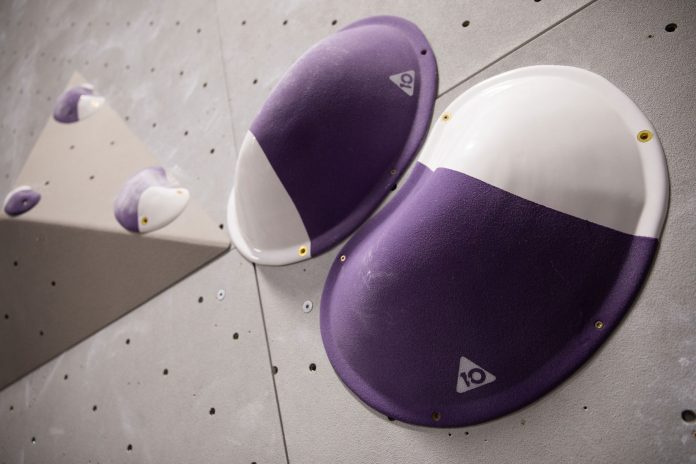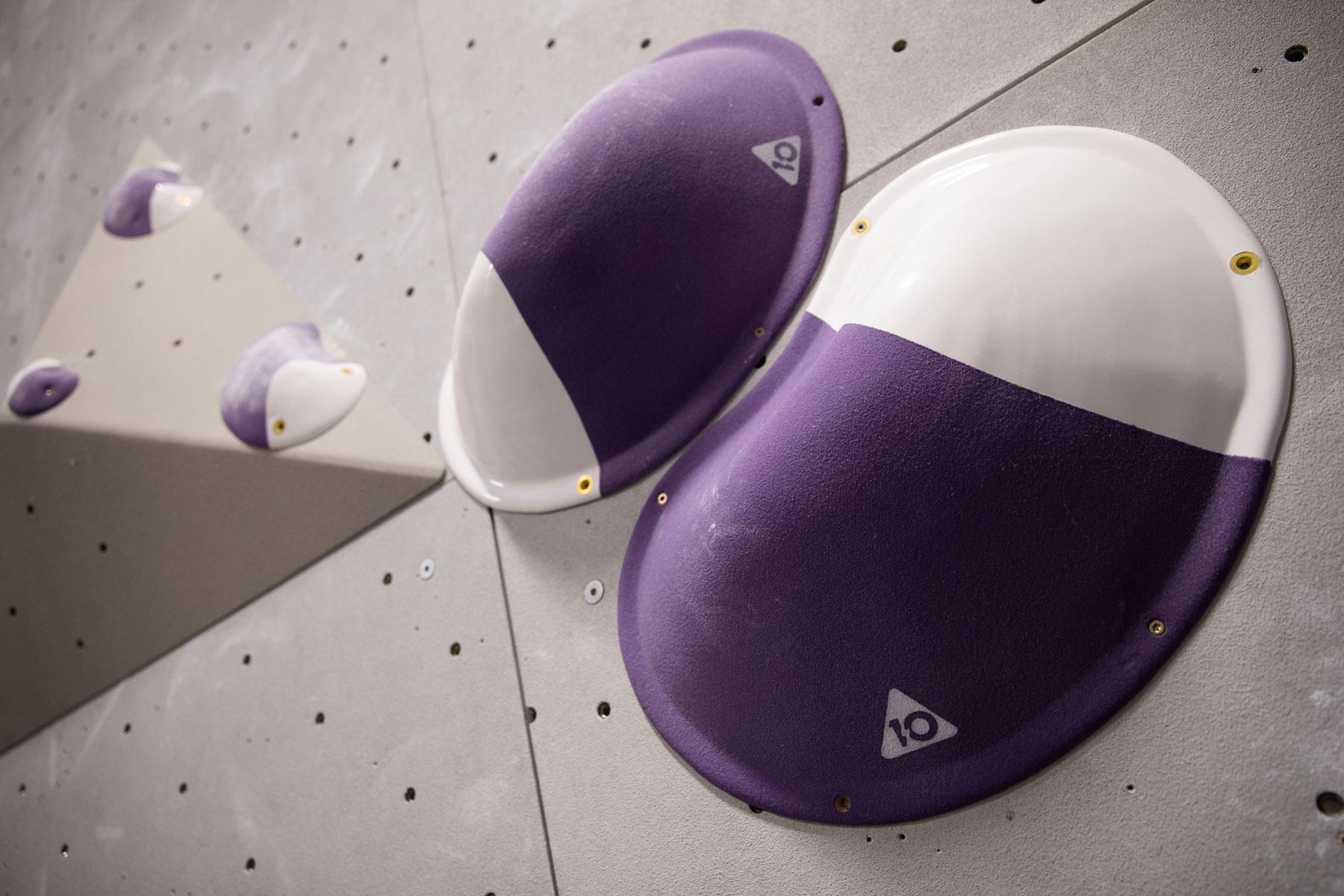
Innovation within the climbing industry has long been driven by the community’s needs, and in that regard, Binary Holds is no exception. A sister brand of the Calgary Climbing Centre (CCC) chain of indoor climbing facilities and Flashed Climbing, Binary initially represented a way to keep business in-house. After all, CCC’s management figured, purchasing holds for five gym locations is an expensive undertaking—it would be cheaper and more efficient to produce exactly what they needed, when they needed it. Production began in 2014.
Like many hold manufacturers, Binary got its start making polyurethane (PU) holds. Over the next handful of years, the brand produced a full catalog of hold shapes and sizes, not only supplying CCC but earning its keep in the market. But something nagged at Binary’s management team, who knew firsthand how much waste a climbing facility can produce: once holds had outlived their usefulness, all that PU ended up in landfills.
There had to be a better way.
Sustainability efforts in the climbing holds sector have evolved a great deal over the years, and the Binary team wanted to take things a step further. “Our goal is to push for a more sustainable climbing industry,” says Binary employee Nevin Alexander. So, in 2020, the company began prototyping holds made from recyclable materials, eventually settling on acrylonitrile butadiene styrene (ABS). It soon became clear that there wasn’t just potential for this recyclable hold idea to work in North America—the technology was ready, and manufacturing could begin in earnest. In November 2022, Binary halted all urethane production and committed to the switch to recyclable materials.
“A thousand years from now, there will still be urethane holds sitting in landfills,” Alexander says. “Urethane, fiberglass, they don’t break down. But ABS plastic is recyclable, and we can do it locally—it’s easily accessible.”
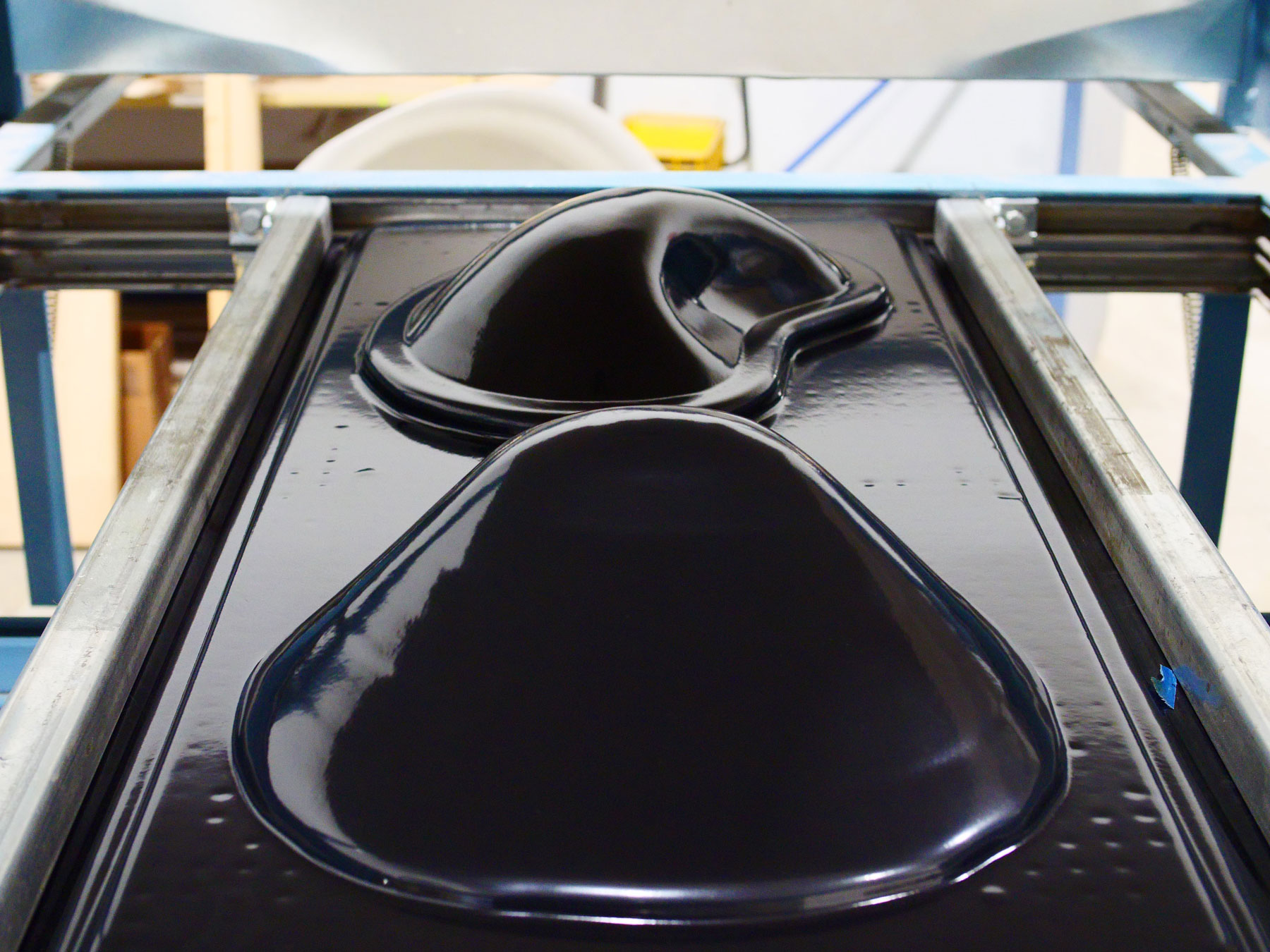
A more sustainable hold…
Binary’s manufacturing technique cuts down on waste at every step in the process. The company uses vacuum thermoforming (VTF) technology, which involves heating a sheet of plastic (ABS, in this case) to the temperature at which it can be reshaped. The superheated ABS is then placed on a mold in the shape of a climbing hold; air is vacuumed out for a tight seal between the plastic and the mold. Once the plastic cools, it’s removed from the mold, leaving a hold unlike any predecessor on the market.
In addition to being recyclable, Binary’s ABS grips are as light as their fiberglass counterparts and continue the hollow-back trend that has reduced plastic consumption over the years. It’s just 6mm of plastic with nothing in the middle, meaning they’re significantly lighter (in some cases, up to 50%) than traditional polyethylene (PE) and polyurethane (PU) holds attached to gym walls across North America, which is a huge advantage for routesetters. Plus, their hollow back also represents considerable cuts to shipping costs, as it allows Binary to nest like-shaped holds of different sizes, fitting more holds in fewer boxes. Setters appreciate the functionality of the new grips, too.
“The first thing that caught my eye was how intentional the dual-texture parts of the holds were—a lot of companies add it for aesthetic purposes, but as a routesetter, it’s easier for me to incentivize movement thanks to those more intentionally placed dual-textured areas,” says Brendan Scorpio, a routesetter at Dyno Detroit. The Dyno Detroit team first encountered Binary Holds at the 2023 Climbing Wall Association Summit in Pittsburgh. They were impressed with the process and sold on the holds after getting a chance to climb on them.
Scorpio also notes an impressive variety of shape sizes available: “Binary offers everything from those big holds to much smaller holds that you’d grab with one or two fingers,” he says. “These work really well for slabs and even for feet,” meaning the Dyno Detroit team can keep the set together rather than having to mix and match with other holds. And with the gym’s 50-foot walls, he says, it makes a big difference that lighter holds means making fewer trips or hauling fewer buckets up the wall—“it’s also easier on our backs,” he points out.
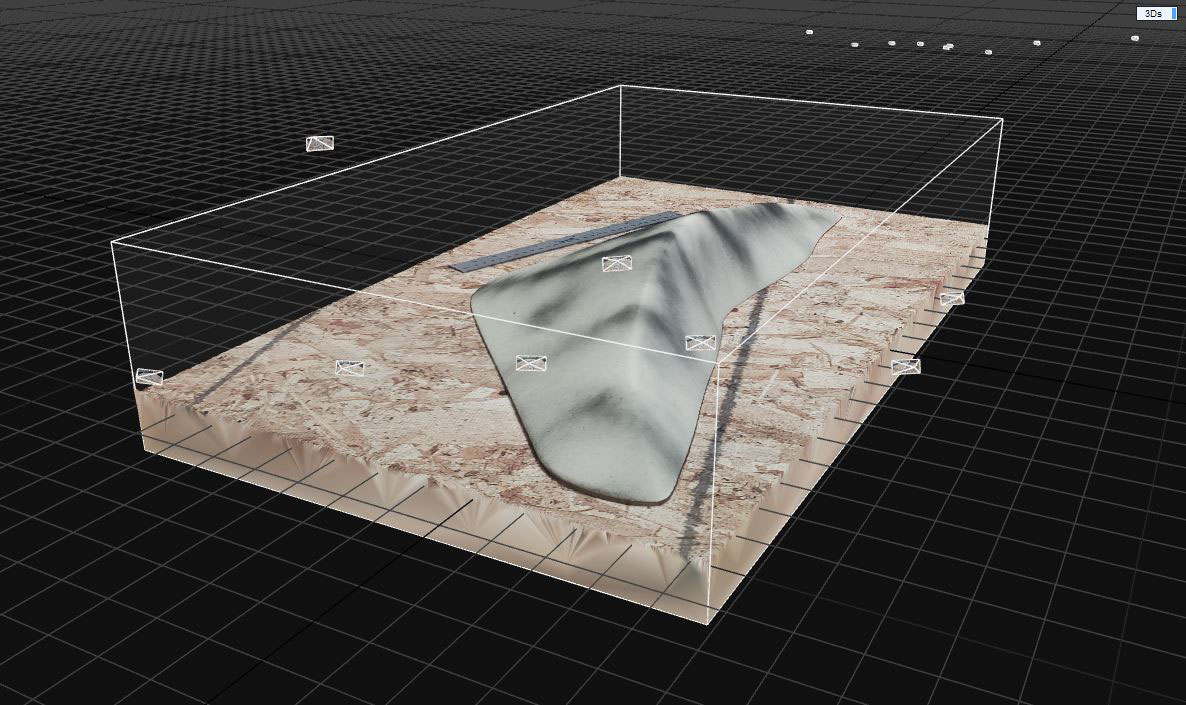
The end result produces less waste, but the process itself is less wasteful, too. Unlike other manufacturing methods, which require different non-recyclable foam models for each size of a given shape of hold, the VTF technology Binary uses relies on a three-dimensional imaging process that can scan existing holds or masters and scale them to any size. No more foam models required.
…for a more sustainable climbing industry
When a hold’s lifespan is over, it can be sent back to Binary to be recycled—literally, melted down and re-formed into a new hold. It’s good for business, too: mispours and production errors no longer represent costly mistakes; they can simply be recycled.
Alexander notes that Binary is still fairly new to the process and is working to make the process more efficient and sustainable—switching to a bio-based epoxy, for example, meaning a percentage of the materials used to manufacture the epoxy is derived from renewable resources (plants), and making the leap from a mix of virgin and recycled plastic to fully recycled. He adds that while the material and method are a bit costlier than traditional PE or PU, they’re not as expensive as one might think.
“By challenging the preconceptions of what climbing holds are, we want to set a new standard for sustainability and inspire other brands to consider more sustainable options for their hold production,” Alexander explains.
Tellingly, Binary is willing to share the knowledge it has acquired about producing holds more sustainably. The brand laid out its process at the 2023 CWA Summit and plans to continue attending industry events to spread the word about just how doable it is to create sustainable climbing holds.
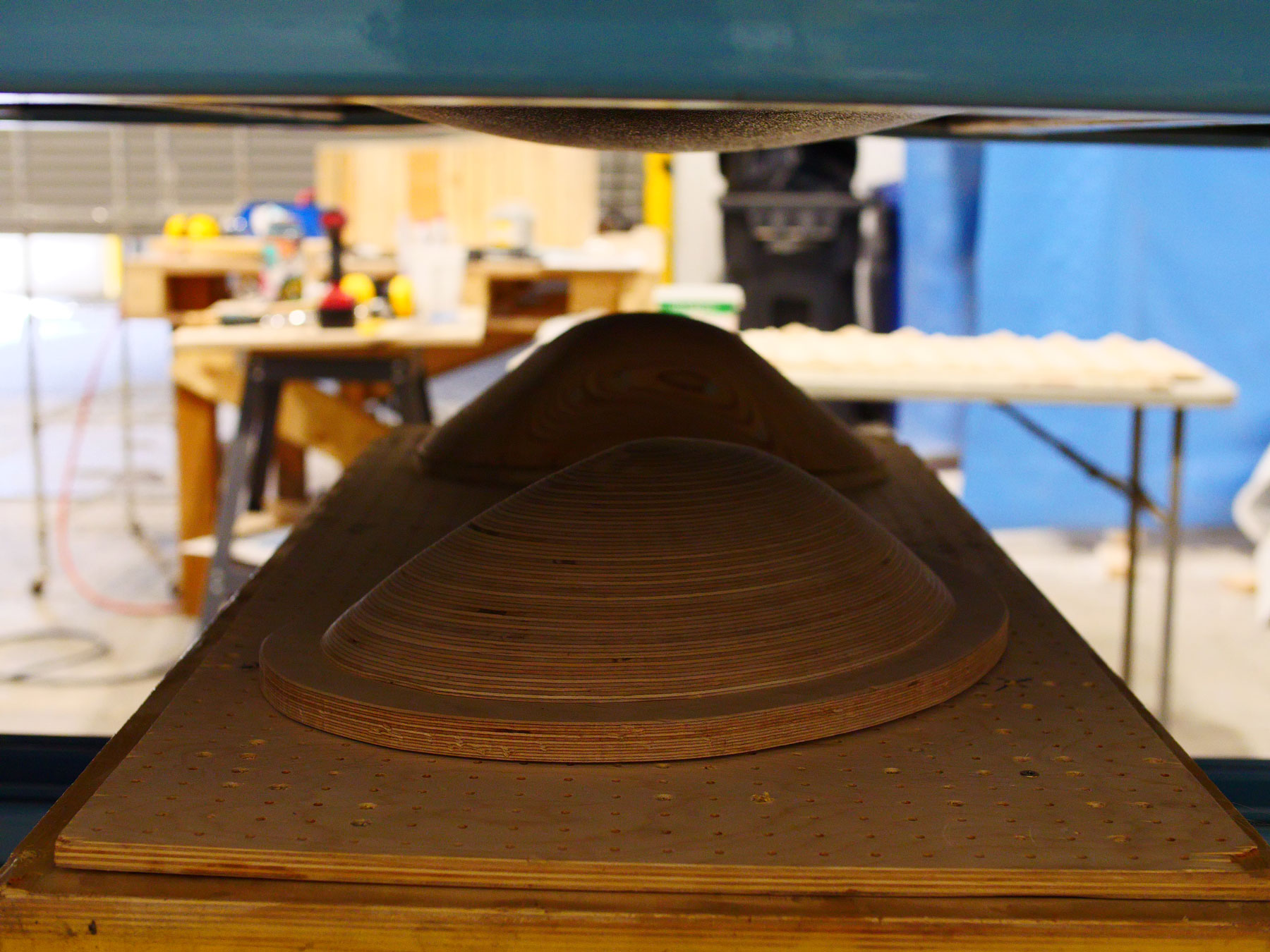
The future is now
“By sharing our process to make ABS holds, we want to show the world that this technology is accessible and ready to go today,” says Alexander.
Ready to go, indeed. At press time, Binary is working with multiple big–name brands—such as Kilter, Urban Plastix and Touchstone—on adding recyclable ABS holds to their lineups, as well as expanding its own shapes and sets. Binary’s own line of ABS holds placed sixth out of 28 competitors—including some manufactured by deeply established brands—at the CBJ Grip Showcase in Pittsburgh last May, confirming that the company has the right ingredients to make a big impact on the industry.
In addition to upgrading its epoxy and switching to fully recyclable materials, Binary plans to improve their facility, acquiring more building space and dedicated machinery, as well as expanding their own lineup of holds, in the next year.
“We envision a world with ‘fully recyclable gyms,’ even if it’s not all our product,” Alexander says. “We’re not trying to keep anything behind closed doors—we want others to start doing this!”
This story was paid for by the sponsor and does not necessarily represent the views of the Climbing Business Journal editorial team.

Binary Holds started in 2014 in Calgary, Alberta. Our mission has always been clear and simple: to create innovative, uncluttered shapes that allow routesetters to set their climbs with intention and clarity. As a team, we are always looking for ways to improve our craft. That’s why when we discovered that there was a better and more responsible way to make holds, we were no longer motivated to continue doing things the conventional way. Switching over to ABS represents our commitment to innovation, sustainability, and the climbers of tomorrow.




